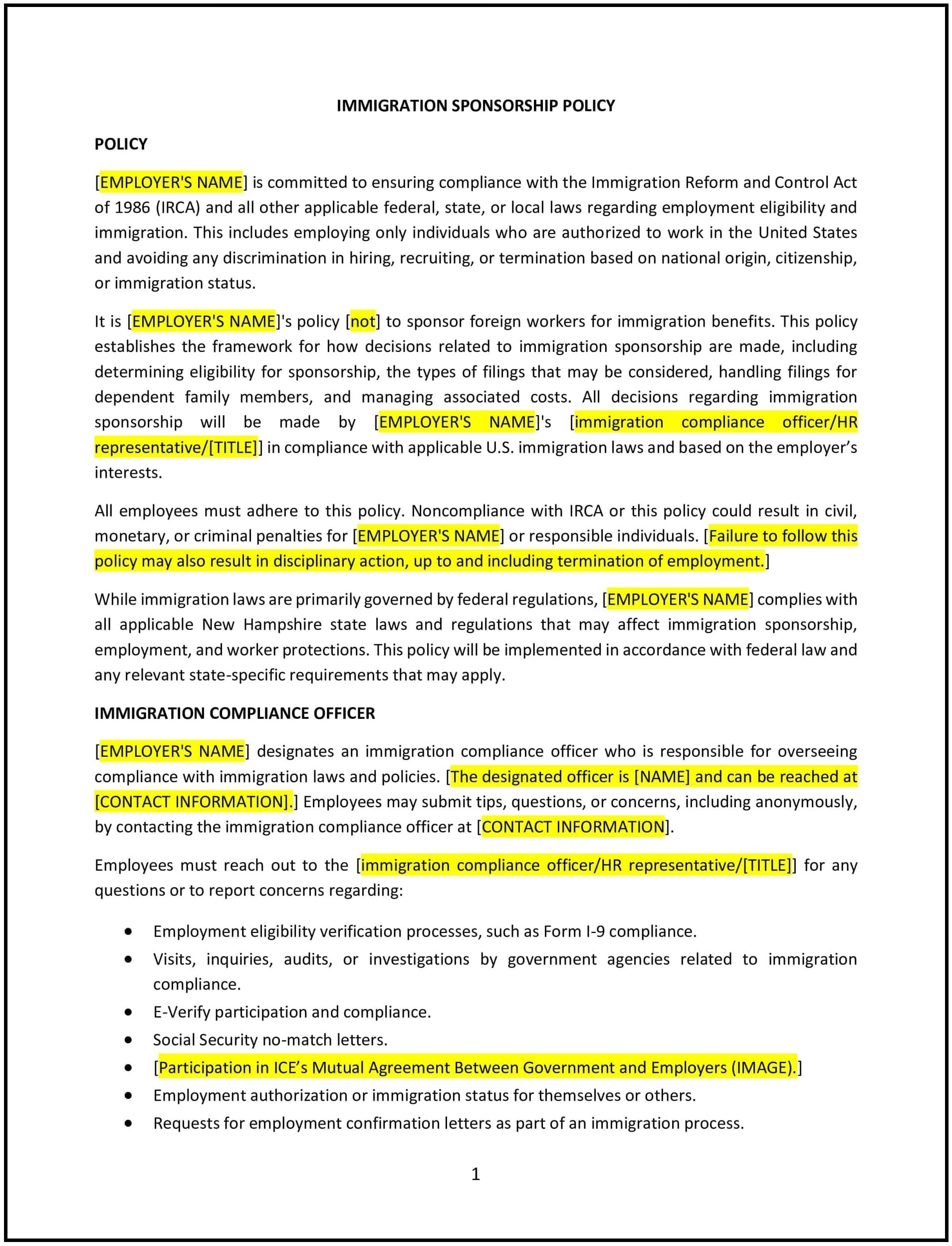Immigration sponsorship policy (New Hampshire): Free template
Got contracts to review? While you're here for policies, let Cobrief make contract review effortless—start your free review now.

Customize this template for free
Immigration sponsorship policy (New Hampshire)
An immigration sponsorship policy helps New Hampshire businesses navigate the complexities of sponsoring foreign workers for visas or permanent residency. This policy outlines the procedures for sponsoring employees for work permits or green cards, including eligibility requirements, documentation, and the company's responsibilities.
By adopting this policy, businesses in New Hampshire can expand their talent pool, comply with immigration regulations, and support employees seeking to work and live in the United States.
How to use this immigration sponsorship policy (New Hampshire)
- Define sponsorship eligibility: Clearly specify the criteria for employees to be eligible for sponsorship, including job roles, qualifications, and how long an employee must be employed with the company before they can be considered for sponsorship.
- Outline the sponsorship process: Detail the steps involved in sponsorship, including the required documentation (e.g., employment verification, labor certification), and the timelines for submitting applications.
- Clarify the company's role: Define the company's responsibilities in the sponsorship process, such as paying for application fees, providing required documentation, and working with legal or immigration professionals to ensure compliance.
- Address visa types: Identify the types of visas the company will sponsor, such as H-1B, L-1, or O-1 visas, and any limitations on the number of employees who can be sponsored at any given time.
- Set expectations for employee cooperation: Specify what the company expects from employees seeking sponsorship, including providing necessary documentation, attending interviews, or assisting with additional paperwork.
- Include considerations for green card sponsorship: If applicable, outline the process for sponsoring employees for permanent residency (green cards), including eligibility, required steps, and timelines.
- Discuss legal obligations: Emphasize the company's commitment to complying with U.S. immigration laws, including maintaining proper records and meeting reporting requirements.
- Review and update: Regularly review and update the policy to reflect changes in immigration laws, regulations, or company sponsorship practices.
Benefits of using this immigration sponsorship policy (New Hampshire)
This policy provides several benefits for New Hampshire businesses:
- Expands the talent pool: By offering immigration sponsorship, businesses can attract highly qualified foreign workers with specialized skills that may not be readily available in the local labor market.
- Supports employee retention: Sponsoring employees for visas or green cards can enhance job satisfaction and loyalty, particularly for employees seeking long-term career growth and stability in the U.S.
- Enhances company diversity: Immigration sponsorship supports workforce diversity by allowing businesses to hire employees from different cultural and professional backgrounds, enriching the company's talent and perspectives.
- Reduces turnover: Employees who are sponsored for immigration purposes may be less likely to seek opportunities elsewhere, as sponsorship often ties them to the company for the long term.
- Ensures legal compliance: A clear immigration sponsorship policy helps businesses comply with immigration laws, avoiding penalties for non-compliance and reducing legal risks.
Tips for using this immigration sponsorship policy (New Hampshire)
- Communicate the policy clearly: Ensure all employees are aware of the company’s immigration sponsorship policy, including who is eligible for sponsorship and the process involved.
- Work with immigration professionals: Partner with legal or immigration experts to ensure that the sponsorship process is handled efficiently and in full compliance with U.S. immigration laws.
- Regularly update employees on their status: Keep employees informed about the status of their visa or green card application, including any delays or additional requirements.
- Set clear timelines: Establish clear timelines for the sponsorship process and communicate any potential delays or complications so that employees know what to expect.
- Stay informed about immigration changes: Regularly monitor changes to U.S. immigration laws and regulations to ensure that the sponsorship process remains compliant with the latest requirements.